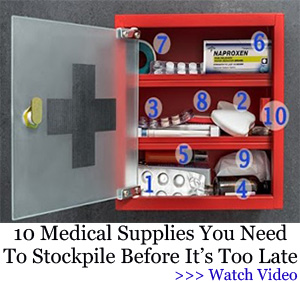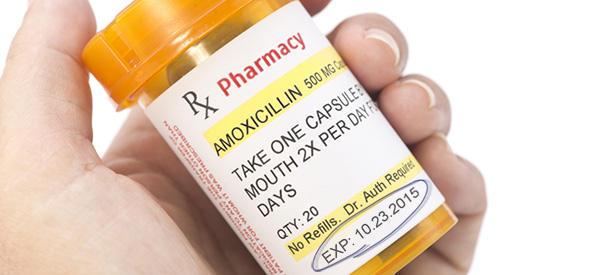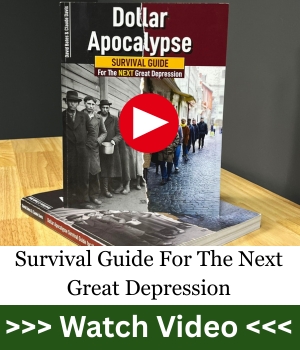We all know that the expiration date on food is more of a guideline than a rule that has to be followed strictly – but what about antibiotics? Every medicine sold in the USA comes with an expiration date marked on the package, but a lot of us don’t take these too seriously. Medicines seem like they should last a lot better than food. Leave a Tylenol caplet and an apple on the counter and see which one rots first. No prizes for getting that one right.
Sadly it isn’t that simple, though. Medicines might not visibly spoil like food, but their active ingredients can break down over time. Sometimes that means they won’t work as well as they should. Sometimes they can become toxic. There are a lot of medicines you can safely use years after the date stamped on the box, but you need to know what ones they are – and what ones to avoid.
What Do The Expiration Dates Mean?
In 1979 the FDA passed a law requiring all drug manufacturers to put an expiration date on their products. Officially, that date tells you how long the drug can be relied on to have the desired effect as long as it’s been properly stored. In reality, manufacturers, wary of being sued by someone who’s taken drugs that have become ineffective or toxic, are pretty conservative with the dates they use.
They pick a date that they’re confident is well within the limit, then build in a little more slack to allow for poor storage. Effectively, the expiration date is one the company is happy to stand by in court. Pharma companies tell people to dispose of expired drugs. Yes, they want you to buy another pack of their product. Actually, the main reason is that when lawyers come knocking because someone got sick from taking expired tablets, they can point at their advice and say “We told you not to do that.”
The reality is that most medicines will stay safe and potent long after the expiration date on the package. This isn’t just a guess, either. We know for a fact that plenty of medicines will work just fine ten, 20, even 40 years after they officially expire.
Related: How to Make the Most Powerful Natural Antibiotic
DoD Use Of Medications
The DoD is one of the USA’s largest buyers of medicines. Every military post has a medical center. Field hospitals and ambulance units hold large stocks of medicines in their deployment stores, and because they never know where they’ll be going and what they’ll have to treat, they have to keep a wide range of drugs. A lot of the drugs the DoD buys never get used. They’re bought, stored in a container ready to be loaded on a plane and flown somewhere dusty, then ten years later they’re taken out, incinerated and the whole process starts again.
In the mid-1980s the DoD started to get fed up paying for medicines that were just going to be incinerated someday, and launched the Shelf Life Extension Program (SLEP) to see if they could hold on to their stockpiles a little longer. Results from that program have been coming in for a few years now, and in general they’re pretty good news.
SLEP Results About Expired Medications
SLEP results published in 2009 found that of 122 medicines tested in one study, 88% of them were still safe and acceptably effective at least one year after they expired – and many were good for much longer than that. In fact the average extension time for all drugs in military storage was 6.5 years. Current DoD policy is not to extend shelf life for more than ten years, but at least one drug was found to be safe and effective 23 years after it expired.
Many medications are based on a few common ingredients, and SLEP has only found two that have lost a lot of their potency a year after expiration – aspirin and amphetamine. Insulin and epinephrine (EpiPens) are two other medications that should never be taken after they’ve expired. They lose effectiveness rapidly outside their planned shelf life.
However, acetaminophen (Tylenol), caffeine, codeine, methaqualone, butalbital, phenobarbital, pentobarbital, secobarbital, meprobamate, hydrocodone and chlorpheniramine are among many common ingredients that stay safe and potent after the expiry date.
What About Antibiotics?
Probably not many preppers are holding a stock of amphetamines, and most people can use Tylenol as a substitute for aspirin, but one type of medication preppers do worry about is antibiotics. These have saved millions of lives since the 1940s, and they’ll be essential after the SHTF. Who wants to survive the EMP apocalypse, then die because a cut finger got infected? So there are good reasons why preppers talk about ways to get their hands on off-prescription antibiotics. But, once you’ve got them, how long can you store them for?
Some antibiotics need to be disposed of when they reach their expiry date. Tetracycline, a popular broad-spectrum antibiotic, is one of them. Using expired tetracycline can cause fatal kidney damage.
Different Forms Of Amoxicillin
Amoxicillin is used for many common infections and is often supplied as a liquid suspension. This shouldn’t be stored for more than 14 days after it was mixed, as it can be infected with resistant bacteria. But, in an overall scenario, does amoxicillin expire? Does amoxicillin go bad?
Tablets or capsules of amoxicillin are stable, – the problem only affects liquid forms. Other liquid antibiotics, including eye drops, are also potentially dangerous when they get old, and should never be used after the expiration date. A key point here is that any bacteria in them have already evolved antibiotic resistance, and you really don’t want them getting into your body if you can help it.
Related: Emergency Bag to Keep In Your Car In Case Of An EMP
Safe Antibiotics To Use Way Past Expiration Date
Many antibiotics can be used well after their expiration dates. These include ciprofloxacin, which is used to treat diarrhea, respiratory infections and typhoid as well as many other diseases. It’s a very useful one to store.
Captopril tablets, flucloxacillin capsules and theophylline tablets will also last for at least 18 months past the expiration date if they’ve been stored properly. Between them these antibiotics will handle most bacterial infections. Overall, if you stick with antibiotics that come in tablet or capsule form they should stay effective for anywhere between two and 15 years after their expiry date.
Dangerous Antibiotics To Use After Expiration Date
Unfortunately there are too many examples of medicines that are and aren’t safe after expiry. There’s no space to list them here. If you notice that medicines in your stockpile are close to expiring, and they aren’t mentioned here, the best thing to do is check online if they can still be safely used. The FDA has a page on SLEP that lists some of the drugs that have extended shelf lives. It’s worth a look.
Using Antibiotics In Emergency Situations
In a real emergency, unless a drug is known to become dangerous past its expiry date, is in liquid form or is obviously spoiled (Excedrin tablets with a vinegary smell, for example) you might as well try any expired medicines you have. They probably won’t hurt, and according to the DoD there’s an 88% chance they’ll help. If you have the option it’s always better to use unexpired medicines, but prepping is all about staying alive when options are scarce. If expired – but probably still effective – medicines are all you have available, it’s usually better to take the chance than do nothing.
Proper Storage For Antibiotics
The most important thing is where you store your antibiotics. This is true for all medicines. The most important tips to remember are:
- Avoid heat, light, moisture, and air exposures. They will damage your antibiotics.
- Store all antibiotics in dry, cool place.
- Do not store your medicine in a typical bathroom cabinet. Heat and moisture coming from your bath, sink, and shower can easily damage antibiotics.
- Be extra careful with capsules and pills as they are particularly susceptible to damage from moisture and heat.
- Whenever possible, keep the original container and use it for storage.
- When you open the medicine bottle, take out the cotton ball. It pulls moisture and then you add that to your bottle without realizing it.
- When you buy antibiotics, ask the pharmacist if there are special storage instructions you need to follow.
- All medication should be kept out of reach and even sight of children. Use child locks or latches.
Avoiding Damaged Medicine
The rule of thumb is to never take damaged medicine, unless your only options are death and taking the antibiotics. Do not take:
- Antibiotics that changed smell, texture, or color. This is true even if the expiry date was not reached.
- Antibiotics or any pills that stick together, are softer or harder than normal, are chipped, or are cracked.
When Should You Call The Doctor After Taking Expired Antibiotics?
Follow the same rules as when the antibiotics are not expired. First take the old medicine and then take the new pills. Basically, prioritize what you take by date. In the event that there is a problem and you do not feel well, just go to the doctor. It is better to be safe. Try to have a letter with you describing your medicines, supplies, and the conditions you suffer from. You can make this list ahead of time to be prepared.
You may also like:
 9 Items To Stock Up On Before Hyperinflation Hits
9 Items To Stock Up On Before Hyperinflation Hits
The Only 4 Remedies You’ll Need When SHTF (Video)
How To Make Your Chickens Lay More Eggs
Why You Should Put A Coin In A Cup Of Frozen Water In Your Freezer






















My question is if you store them in vacuum packed bags such as a food saver brand and then store them in a cool dark place will they last much longer?
Storing them in a cool, dark place is usually recommended anyway; if you DON’T do that, they might not even last until their expiration date. As for vacuum packing them, that probably isn’t going to make much difference. Unused antibiotics should be in a sealed container anyway.
Typically the recommended storage parameters are 65°F and 50% humidity in a dark storage. That doesn’t mean that you must store them in the back corner of the basement. I store my expendables in cardboard boxes. That makes it dark. It doesn’t have to be the absolute darkness of some deep cave. Don’t freeze them as freezing can render some things useless. Much like the urban legend of storing your batteries in the freezer of your refrigerator.
Many drugs come in brown or orange bottles. That is the equivalent of “dark”, although in my opinion, orange is a poor substitute for dark brown. I think it is a compromise color. Clear enough to see the contents, dark enough to cut the ultraviolet light waves that do the aging. It’s hard to see the meds in a brown bottle.
Funny thing is my family likes to joke with me cause I like to prep. Never once thought about it that I’m a two time transplant patient. Was brought to my attention in one of their joke sessions that without my transplant meds I wouldn’t last a few months. Sort of made me look at things differently. But I still like to prep, at least I can assure my kids and wife are in a better spot.
It’s not just for ourselves that we prepare, it is for those who are dependent upon us for their sustenance and protection.
I prep also so that any of my family who inherits my house will automatically be prepared. I think of it like putting money in a savings account. If I don’t use it during my life, my family can use it or pass it on to the next generation. I speak of durable items: fire starter, solar oven, solar grill, water purifier, tent, bug out bag, survival books, solar chargers, etc.
I would not store abx if you paid me. I would however keep bottles and bottles of essential oil which has been proven to be more effective than drugs as they are antiviral antibiotic antiparasitic and come from plants. Look up sesquiterpenes and monoterpenes and phenolpropanoids. I teach classes on them. Some are $100 a bottle and some are $6. Some citrus peels are antitumoral. The shelf life of an essential oil of a plant is far longer than a synthetic lab made drug which has secondary tertiary and more effects that are undesirable. Not side effects. Effects. They are side anything. They happen. Theyre effects.
Go buy the book Healing Oils of the Bible by David Stewart PhD if you really want to blow your mind. It will scare you then give you everything you need to be relieved that your medicine cabinet just needs a few tweaks to be perfect- and it does NOT include garbage and synthetic cancer causing wasted bottles.
God already created the most powerful antibiotic. Clove. Look up the ORAC scale. Look up ningxia goji berries. Its already here. And none of it comes from big harma. Lord almighty- who wants to buy that trash? No thanks.
Yes. Agreed on colloidal silver. And no you dont turn blue. Do some research. Youll be amazed at how one bottle of oregano, one cedarwood, and one frankincense can do a lot. Have some clove on hand and see what it does.
Look up the British Museum of Natural History and thieves recipe. Chlorophyl chlorella is a better detox. I would never want to put antibiotics from a drug company in my body when i can just stay healthy and have a high immune system w elderberry syrup. Easy. Cheaper. Faster. This article just confirms the extent to which people have infiltrated your medicine cabinet w big harma. Dont be a sheep. Be an apothecary.
Your kidneys can’t break down frankincense in essential oil form. Use it a regularly and you are headed for kidney failure
Always appreciate your articles. But what frustrates me is when an author starts to investigate a subject and then begs off with the excuse that “There’s no space to list them (or go into that) here.” I looked at the SLEP link and it was not very informative. You would think that this is a subject of great importance to, not only the prepper community, but everyone who needs, takes or has pharmaceuticals that they rely on for continued good health. Is there a source for this information? If not, could someone provide such info?
Floyd: I too looked at the SLEP web link and it was typical government pub, full of meaningless words signifying nothing. Even clicking on one of the links on the SLEP site only referred to Tamaflu which was a couple of years ago.
I wondered if I was missing something, but apparently at least two of us found the link to be not quite helpful.
That’s why, when I wrote my article on bicycling and alternative vehicles for bugging out it was a three part series. Too much needed information for a 250 word twitter message.
same here..SLEP link had no list of drugs and how long past expiration they’re safe.
Just trying to make the message a little bit more precise the following can be said:
-the date of expirement is mainly a juristical term. On
this date the manufactur´s warranty ends.
-this has little do do with the effectivness of a drug,
Some people believe that usage on the following day
can be dangerous. This is clearly nonsense, since
most medications degradate quite slowly if packed and
stored properly.
-three factors have to be considered: temperature, light
and oxygen. The most has been said already.
-solutions or liquids in bottles allow oxygen from the
air to come in contact with the liquid once they are
opened up. These should not be used more than 2-4
weeks after opening the bottle.
-the best packaging for pills, tablets. capsules and
similar forms are blisters, containing nitrogen
(=chemically nearly inert gas). This nitrogen filling
preserves the properties of the drug best.
But not all those blisters contain
nitrogen. Some people claim they can smell or taste
nitrogen, it´s something dull or muggy. You may know
this taste from whipping ceam in spray cans tasting
differently from freshly whipped cream containing air.
Not easy to perform on blistered drugs, but you can try
to put your nose near to the blister when you remove a
tablet from the blister. A safer way is to ask the
manufacturer what kind of gas is in his blisters.
-packing pills and tablets in bottles is in fact an obsolete
packing method as it shortens the time of proper
usability.
But manufacturers have absolutey no interest for this
topic as it is detrimental for their buisiness, They want
to sell the same medication again and again.
-creams, pastes, salves, unguents, emulsions and
similar products unmix and deteriorate with time.
Everyone knows the phenomenon when after opening
an older tube some liquid will drop out of it. So the
possible storage time of all those products is much
shorter than of pills, tablets or capsules. In most cases
this is not really dangerous but unsavory. If the tube
had been opened already, the effect of oxygen to the
first part of the content has to be considered. Pressing
out a small amount of the content will make the rest of
the tube usable. You may know this from toothpaste.
-keeping drugs in a normal fridge (+8 centigrades) will
decelerate drug deteroration and extend usability.
Please feel free to ask me further questions if desired.
Colloidal silver just might be the answer to many of the antibiotic questions. There is a reason that most of the victims of the black plague were poor, and very few were wealthy. That proverbial ‘silver spoon’ saved many lives, due to the tiny traces of silver that made it through the digestive system, into the bloodstreams of the wealthy. The poor, often not having spoons at all, lived (germy) hand to mouth.
I know colloidal silver is popular, but I wouldn’t want to rely on it if my life was in the balance. Silver can kill bacteria, including antibiotic-resistant ones, but there’s no evidence at all that it can do that once the bacteria are in your body. Colloidal silver also interferes with your body’s ability to absorb other drugs, and it can turn your skin blue as well.
I had pneumonia last year, and instead of taking the antibiotics and inhaler the doctor gave me, I took colloidal silver. I did not turn the least bit blue, and the pneumonia went away. I have been taking silver different times for the last about 10 years. I believe that blue guy took a huge amount of the silver, not the recommended amount, or even 2 or 10 times the recommended amount. It was a lot more than that. So far, everything I have taken the silver for, it has worked. I also use silver gel for cuts, etc.
It’s also helped me, with sinus infections, cuts & scrapes. Next week, I’ll be using it for some dental work.
I read the DOD report a number of yrs ago and I think there was even another follow up one after that. For the most part as I underfsto0od it MOST drugs are good FAR after their expiration dates. There are exceptions such as MOST liquid meds, The DOD was also cautious to not make it sound like it should be automatic so they test the drugs they keep beyond the expiration dates to make sure they are still good. Some, maybe most, have been still good 20yrs after the expiration dates. Storage is the key. Cool dark place and properly sealed. I put mine in vacuum bags just to make sure they stay dry..It even works for things like aspirin. But like all things it should be YOUR choice on how you do this. Most med companies also want to make you buy new meds so they change the packaging as well. For me I feel meds are already WAY too expensive even though I do believe the companies have every right to make a profit. If they didn’t why would they make the drugs? Do your own research on the drugs you use. Find that DOD report and read it as well. Things like antibiotics DO keep for decades after their expiration dates except for the liquid kind. Injectables are the same like insulin. There are also “weeds” that are just as effective as some antibiotics. And dont forget honey makes a good antibiotic for wounds and kerosene works great on cuts — yes I said kerosene\. They bused both honey and kerosene during the civil war for wounds.The kerosene cauterizes the cut/wound so that you have virtually NO PAIN afterwards and it is antiseptic as well. I have used it on every cut I have ever had for the last 40yrs after I learned about it with ZERO problems. You CAN also use animal antibiotics safely but I will let you do the research on that. Hint– doctors will tell you NOT to use them but they are made in the same plants as human meds. using the same ingredients.
I’m always amazed at preppers who try to find ways to make bad stuff edible. I recognize that years after SHTF that might be important but not today. Why would I take outdated medicines when Walmart has Equate for pennies a dose.
While food and medicines, along with other supplies, are plentiful, keep your stores as fresh as possible.
Articles like this are helpful to understand what to look for post-SHTF so read and study in preparation but buy new stuff every year and toss the old, for as long as fresh is available.
The idea is to NOT use these drugs NOW but after the SHTF. I would rather have them and NOT need them than need them and not have them. And as the DOD report found out MOST drugs (not ALL) can be safely used for years after the expiration date.Especially OTC drugs. Most of their expiration dates are because the companies want you to buy new stuff so they also change the packaging to make it look “new” to you.so you will buy new.
This is also true with antibiotics. I woudn’t use them NOW but when the SHTF I would in a skinny minute if I needed them. Thats why you should stock up on fish or animal antibiotics. Most last for MANY yrs past their expiration dates and are made in the same facilities as human antibiotics using the SAME ingredients. You just have to adjust the amounts for humans. Most of the time you use the amounts that are used for pigs. I won’t use them uj nless we have a SHTF time when everything has gone to hell and pharmacies and doctors aren’t available. By then it won’t matter what the label says if you really need it. I wont give you the adjustments for using animal antibiotics or where to get them or the articles about this as I WANT you to do the research so you will feel safer using them. I am NOT a doctor as well so I dont want to be accused of practicing medicine. What I have said HERE is what I would do and I am NOT saying YOU should do the same I KNOW what I will do.
I’ve been making colloidal silver for over twenty years with the silver generator from the Silver Lung Co. There’s no such thing as silver poisoning, silver has been used for thousands of years to eradicate viruses and bacteria; however, if you OD on colloidal/ionic silver, your skin may turn blue “Agyria”. The blue guy was taking like over two quarts a day.